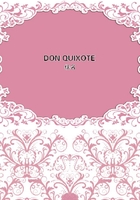
第75章
Sancho made a bag of his coat, and, getting together as much as he could, and as the bag would hold, he loaded his beast, and then hastened to obey his master's call, and helped him to remove the bachelor from under the mule; then putting him on her back he gave him the torch, and Don Quixote bade him follow the track of his companions, and beg pardon of them on his part for the wrong which he could not help doing them.
And said Sancho, "If by chance these gentlemen should want to know who was the hero that served them so, your worship may tell them that he is the famous Don Quixote of La Mancha, otherwise called the Knight of the Rueful Countenance."
The bachelor then took his departure.
I forgot to mention that before he did so he said to Don Quixote, "Remember that you stand excommunicated for having laid violent hands on a holy thing, juxta illud, si quis, suadente diabolo."
"I do not understand that Latin," answered Don Quixote, "but I know well I did not lay hands, only this pike; besides, I did not think I was committing an assault upon priests or things of the Church, which, like a Catholic and faithful Christian as I am, I respect and revere, but upon phantoms and spectres of the other world; but even so, I remember how it fared with Cid Ruy Diaz when he broke the chair of the ambassador of that king before his Holiness the Pope, who excommunicated him for the same; and yet the good Roderick of Vivar bore himself that day like a very noble and valiant knight."
On hearing this the bachelor took his departure, as has been said, without making any reply; and Don Quixote asked Sancho what had induced him to call him the "Knight of the Rueful Countenance" more then than at any other time.
"I will tell you," answered Sancho; "it was because I have been looking at you for some time by the light of the torch held by that unfortunate, and verily your worship has got of late the most ill-favoured countenance I ever saw: it must be either owing to the fatigue of this combat, or else to the want of teeth and grinders."
"It is not that," replied Don Quixote, "but because the sage whose duty it will be to write the history of my achievements must have thought it proper that I should take some distinctive name as all knights of yore did; one being 'He of the Burning Sword,' another 'He of the Unicorn,' this one 'He of the Damsels,' that 'He of the Phoenix,' another 'The Knight of the Griffin,' and another 'He of the Death,' and by these names and designations they were known all the world round; and so I say that the sage aforesaid must have put it into your mouth and mind just now to call me 'The Knight of the Rueful Countenance,' as I intend to call myself from this day forward; and that the said name may fit me better, I mean, when the opportunity offers, to have a very rueful countenance painted on my shield."
"There is no occasion, senor, for wasting time or money on making that countenance," said Sancho; "for all that need be done is for your worship to show your own, face to face, to those who look at you, and without anything more, either image or shield, they will call you 'Him of the Rueful Countenance' and believe me I am telling you the truth, for I assure you, senor (and in good part be it said), hunger and the loss of your grinders have given you such an ill-favoured face that, as I say, the rueful picture may be very well spared."
Don Quixote laughed at Sancho's pleasantry; nevertheless he resolved to call himself by that name, and have his shield or buckler painted as he had devised.
Don Quixote would have looked to see whether the body in the litter were bones or not, but Sancho would not have it, saying:
"Senor, you have ended this perilous adventure more safely for yourself than any of those I have seen: perhaps these people, though beaten and routed, may bethink themselves that it is a single man that has beaten them, and feeling sore and ashamed of it may take heart and come in search of us and give us trouble enough. The ass is in proper trim, the mountains are near at hand, hunger presses, we have nothing more to do but make good our retreat, and, as the saying is, the dead to the grave and the living to the loaf."
And driving his ass before him he begged his master to follow, who, feeling that Sancho was right, did so without replying; and after proceeding some little distance between two hills they found themselves in a wide and retired valley, where they alighted, and Sancho unloaded his beast, and stretched upon the green grass, with hunger for sauce, they breakfasted, dined, lunched, and supped all at once, satisfying their appetites with more than one store of cold meat which the dead man's clerical gentlemen (who seldom put themselves on short allowance) had brought with them on their sumpter mule. But another piece of ill-luck befell them, which Sancho held the worst of all, and that was that they had no wine to drink, nor even water to moisten their lips; and as thirst tormented them, Sancho, observing that the meadow where they were was full of green and tender grass, said what will be told in the following chapter.